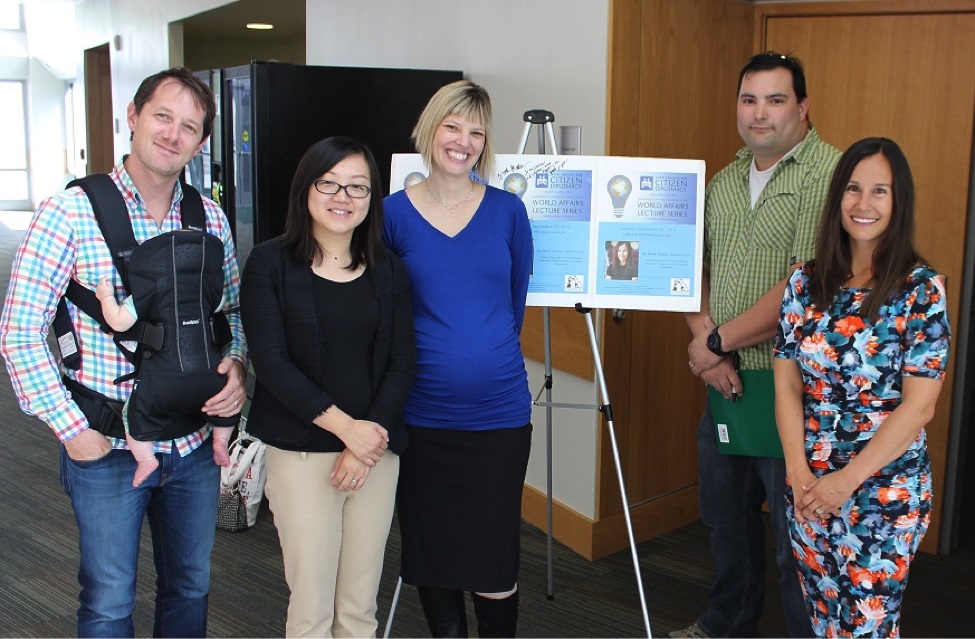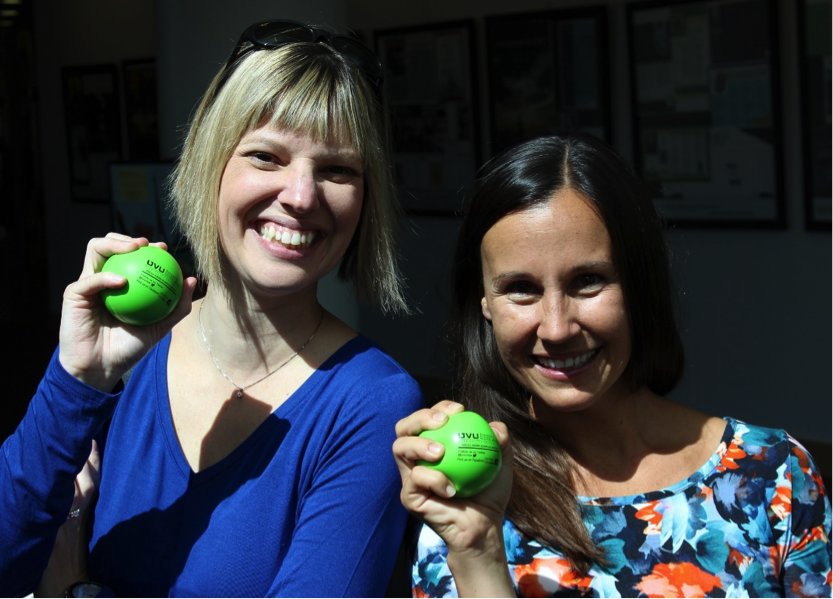
Brook Meakins, a graduate of the University of Oregon’s School of Law, is a family lawyer and advocate for global climate change. On September 20, 2016 she met with students at Utah Valley University (UVU) as part of her visit to Utah under the invitation of the Utah Council for Citizen Diplomacy (UCCD), member of the World Affairs Councils of the America. UCCD is hosted by Westminster College in Salt Lake City, Utah. Her lecture title was: “Climate Change and Low Lying Island Nations: Relocation, Foreign Aid, and International Opportunity”

(R to L) Brook Meakins, Tony Medina, President, UIMF, Beth Martial, Executive Director, Utah Council for Citizen Diplomacy, Hong Pang, Assistant Professor, UVU, and Andy Meakins.
Mrs. Brook Meakins travels to many island nations to help them in sustainability and the issues caused by climate change. So why would an advocate for low lying island nations come to visit Utah Valley University? Just like the island nations, mountainous regions of the world are affected by climate change in similar ways. UVU, and the Utah International Mountain Forum (UIMF) a coalition of student clubs at UVU in particular, hosted the fourth International Women of the Mountains Conference October 7-9, 2015 to advocate for the United Nations sustainable development goals (SDGs), including gender advocacy, economic opportunities, and climate change.
The members of the UIMF are actively engaged in SDGs promotion and the “Utah model” of sustainable mountain development in particular and sharing it with the mountainous communities around the world. The UIMF is no stranger to island nation issues, as it was honored to host and discuss the impact of climate change on the Small Island Developing States (SIDS) with Ambassador Peter Thomson, current President of the United Nations General Assembly and Permanent Representative of Fiji to the UN, during his visit to UVU in December 2015.
Mrs. Meakins shared her experiences of working with four nations in particular that are in danger of rising sea levels: Tuvalu, Kiribati, The Marshall Islands, and the Maldives. These Islands are only a few feet above sea level and face many issues, including: safe drinking water shortages, food security issues, and garbage and sanitation issues. Research has shown that low-lying nations produce the lowest amounts of carbon emissions, but are the most severely effected by the emissions of industrial nations.
According to Mrs. Meakins, the Maldives is a country barely seven-feet above sea level, and relies heavily on tourism. To remedy this, the government under ex-president Nasheed, took the initiative to tax tourists for additional income and to help alleviate some of the islands issues caused by the tourists. Unfortunately, the shoreline is disappearing as well, so the on-staff workers place sandbags under the sand to make the shoreline appear to be perfect even though it is eroding away. As a remedy, the country has looked at options to buy property in other countries in order to save the nation from possible disappearance in the future. This is also true for Tuvalu, Kiribati and the Marshall Islands. Each with large populations; many of which have emigrated to New Zealand, and the United States as a solution.
This is a very difficult solution, however, because the culture and environment is completely different from what they are used to. Islanders do not want to think that one day their nations could disappear, but the evidence is piling up that it is happening. Brook has used legal options and litigation in order to help some of these nations. However, many of them choose not to use legal means, as their culture persuades them from the confrontation it involves. Many of the reasons include: the populations either don’t think it is right, they are worried that they may lose the aid they are already receive, possible regime change, or religious reasons. In the case of the Marshall Islands, and the Banabas, they gave up their land to the US Government who used the land for nuclear weapons testing and phosphate mining. Decades later, these people want to return to the places they once called home. Some have even returned, despite the obvious health risks. With the case of Vunidogoloa Fiji, they decided to relocate themselves. They became the first village to apply for relocation from the Fijian government, ultimately moving just up the hill above the old village where they lived. This has become an example for other villages and nations due to the extremely successful transition. This was due in part to the people did this themselves, with the government providing the funds necessary. In order to help people all over the world that are affected by climate change, education is needed as well as a strong sense of self-preservation.

(R to L): Brook Meakins and Beth Martial, Executive Director, Utah Council for Citizen Diplomacy with UVU stress-bolls after presentation
Islands throughout the world are becoming more vocal about receiving aid from other countries. Rather than directly interfering with these problems, governments have been searching for creative alternatives to provide aid. As the world changes at an accelerated rate, diplomats weigh the immediate versus long term needs of these nations and people. Island nations are effected immediately by climate change, but eventually, most of the world will be effected as well. In order to preserve the planet we live on, we need to make sure we are take care of it. This isn’t just an issue about the planet, it is a human rights issue as well. Brook travels in order to spread awareness and inform people of the impacts of climate change. As the message is spread, funds are provided, friends are made, and sustainability projects are developed.
During the Q&A session, members of UIMF asked for advice from Mrs. Meakins regarding whether her lessons of working with SIDS on the impact of climate change are applicable to the similar type of advocacy dedicated to the challenges experienced by climate change by mountain communities. They also shared with her their own initiatives and informed her about their contribution to the activities and agenda of the UNFCCC COP21 in Paris in December 2015.
Christian Jensen V., member of the Utah International Mountain Forum, a coalition of student clubs at Utah Valley University

